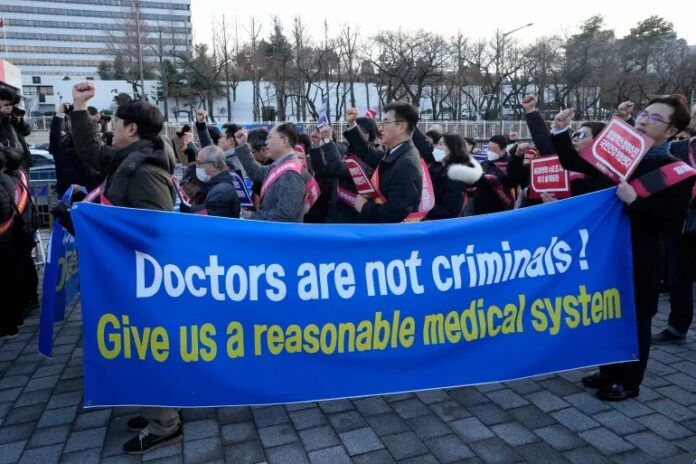On Monday, South Korea announced its intention to suspend the licenses of striking resident doctors who have refused to comply with orders to return to work amidst a standoff regarding reforms in medical training.
Approximately 10,000 junior doctors initiated a walkout nearly two weeks ago to protest against a planned increase in medical school admissions starting next year. This increase is aimed at addressing shortages in medical personnel and meeting the needs of an aging population.
Despite a government deadline of February 29 for the doctors to resume work or face legal consequences, including potential arrest or license suspension, the striking trainees have largely remained defiant. Second Vice Health Minister Park Min-soo stated at a press briefing that despite government appeals, only a small number of doctors have returned to work.
The government has now announced its implementation of legal measures, including conducting inspections at hospitals nationwide to determine which doctors have returned to work and which have not. Those found absent from duty during these inspections will be notified that their licenses are being suspended.
The ongoing strike has resulted in significant disruptions in hospital services, with many critical treatments and surgeries being canceled. The government has raised its public health alert to the highest level as a result. Some major hospitals have reported canceling up to half of their scheduled surgeries since last week.
Under South Korean law, doctors are prohibited from striking, and the government has requested police to investigate those involved in the strike. This latest warning follows the government’s deadline for the resident doctors to return to work by February 29 while maintaining its commitment to increasing medical school admissions by 65 percent.
The South Korean government aims to admit an additional 2,000 students to medical schools annually starting next year to address what it considers to be one of the lowest doctor-to-population ratios among developed nations. \
]While doctors express concerns that the reforms may compromise service quality and medical education, supporters argue that doctors are primarily motivated by protecting their salaries and social status. Polls indicate that up to 75 percent of the public support the proposed reforms.



